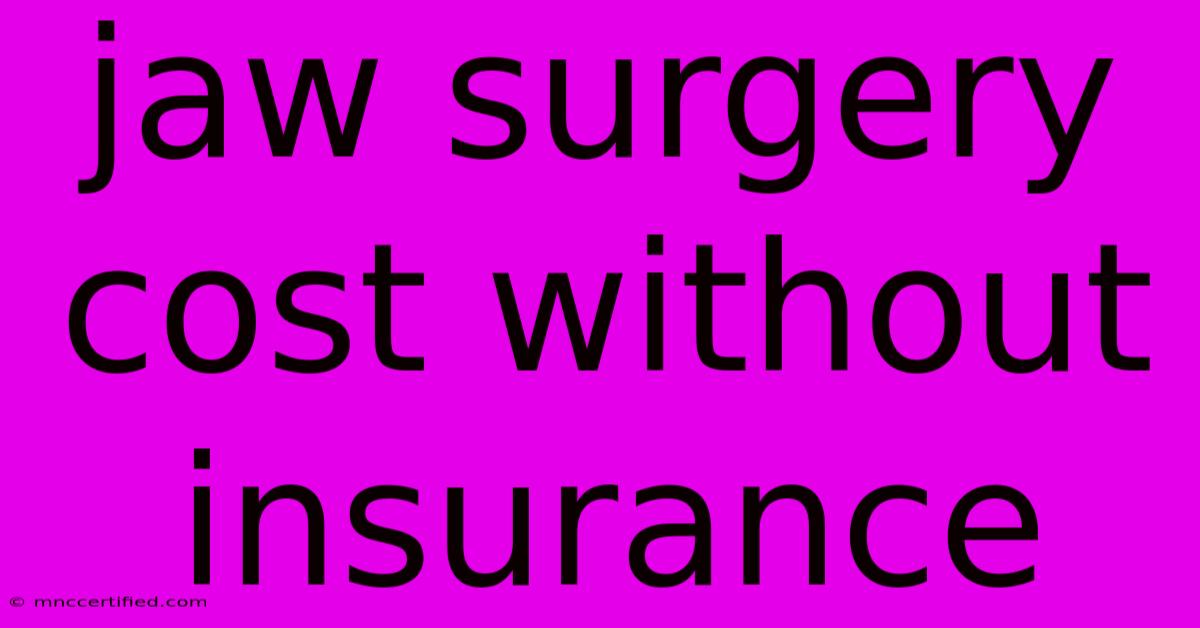Jaw Surgery Cost Without Insurance

Table of Contents
Jaw Surgery Cost Without Insurance: A Comprehensive Guide
Jaw surgery, also known as orthognathic surgery, can dramatically improve facial aesthetics and bite function. However, the cost without insurance can be substantial, often leaving patients wondering how to afford this life-changing procedure. This comprehensive guide breaks down the various factors influencing the price, provides realistic cost estimates, and explores financing options to help you navigate this financial landscape.
Understanding the Factors Affecting Jaw Surgery Cost
Several key factors contribute to the overall expense of jaw surgery without insurance coverage:
1. The Complexity of the Procedure:
The most significant factor impacting cost is the complexity of the surgery itself. Simple procedures, like correcting a minor overbite, will generally be less expensive than complex surgeries involving multiple jaw adjustments or bone grafts. The extent of bone restructuring, the number of teeth needing adjustment, and the type of anesthesia all play a crucial role.
2. Surgeon's Fees:
Surgeons' fees vary significantly based on their experience, reputation, and geographic location. Highly experienced and renowned surgeons in major metropolitan areas typically charge more than those with less experience or in smaller towns. It's crucial to research and compare fees from multiple surgeons in your area.
3. Anesthesia and Hospital Fees:
The type of anesthesia used (general or local) and the hospital or surgical facility's fees contribute considerably to the overall cost. Inpatient procedures, requiring an overnight stay, will be more expensive than outpatient procedures.
4. Pre- and Post-Operative Care:
The costs associated with pre-operative consultations, diagnostic tests (like X-rays and CT scans), and post-operative appointments and follow-up care are also part of the total expense. These costs can add up, so it's essential to get a clear breakdown from your surgeon.
5. Orthodontic Treatment:
Jaw surgery often requires orthodontic treatment (braces) before and after the surgery to align the teeth and optimize the surgical outcome. The duration and type of orthodontic treatment will further influence the overall cost. This is a significant additional expense that many overlook when budgeting for jaw surgery.
Realistic Cost Estimates for Jaw Surgery Without Insurance
Providing an exact figure for jaw surgery without insurance is impossible, as costs vary dramatically. However, a reasonable estimate for the total cost (including surgery, anesthesia, hospital fees, orthodontics, and post-operative care) would range from $30,000 to $80,000 or even more in some cases.
This wide range reflects the variability discussed above. It's vital to receive a detailed cost breakdown from your chosen surgeon during your consultation. Don't hesitate to ask specific questions about each component of the cost.
Financing Options for Jaw Surgery Without Insurance
Facing such significant expenses can be daunting. Fortunately, several financing options can make jaw surgery more accessible:
- Medical Loans: Several companies specialize in providing medical loans with competitive interest rates. Research different lenders and compare their terms before making a decision.
- Health Savings Accounts (HSAs) and Flexible Spending Accounts (FSAs): If you have an HSA or FSA, you might be able to use the funds to partially cover the surgery costs.
- Payment Plans: Some surgeons offer payment plans to help patients manage the cost over time. Discuss this option directly with your surgeon.
- Crowdfunding: Consider launching a crowdfunding campaign to raise funds from friends, family, and the broader community.
- Savings and Investments: Utilize personal savings and investments to fund the surgery, possibly supplementing with other financing options.
Conclusion: Planning for Jaw Surgery Without Insurance
Undergoing jaw surgery without insurance requires careful planning and budgeting. Understanding the factors that influence the cost, obtaining multiple cost estimates, and exploring available financing options are crucial steps to ensure a financially responsible approach to this significant investment in your health and well-being. Remember to prioritize choosing a qualified and experienced surgeon whose expertise justifies the cost. Don't rush the decision; take your time to research and make informed choices.

Thank you for visiting our website wich cover about Jaw Surgery Cost Without Insurance. We hope the information provided has been useful to you. Feel free to contact us if you have any questions or need further assistance. See you next time and dont miss to bookmark.
Featured Posts
-
Next Full Moon Last Supermoon Of 2024
Nov 15, 2024
-
2026 World Cup Venezuela Vs Brazil Online
Nov 15, 2024
-
Nations Game France Israel End In Draw
Nov 15, 2024
-
Taylor Swift Toronto Fans Gather Downtown
Nov 15, 2024
-
John Lewiss Shocking Christmas Ad
Nov 15, 2024